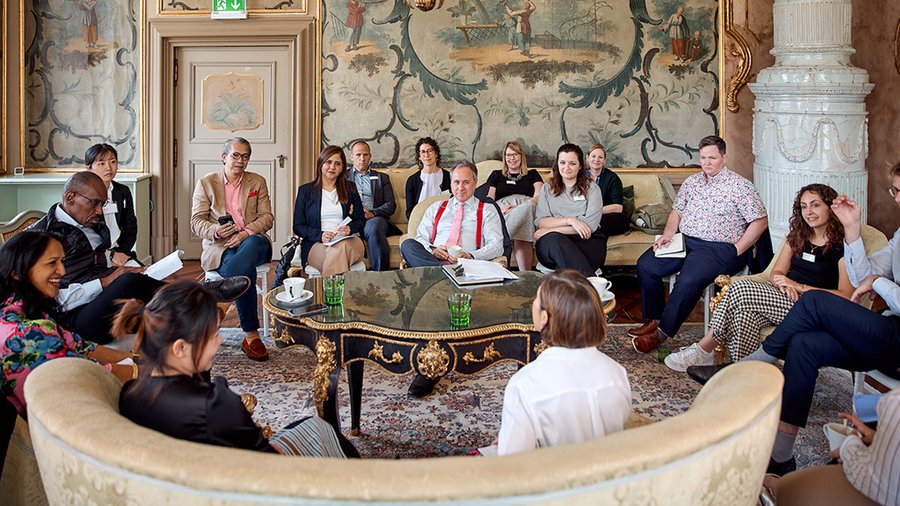Salzburg Global Fellows from Taiwan, Indonesia, and India weigh in on democracy, resilience, and regional power dynamics
As part of our Salzburg Global Weekend in June 2024, Salzburg Global Fellows held salon-style discussions to provide a “tour d’horizon” and share their views from several countries in Asia. These discussions addressed questions critical to understanding the expectations and assumptions of “East” and “West” and highlighted perspectives on the future of multipolar engagement, cooperation, and potential conflict.
A View From Taiwan
Syaru Shirley Lin, founder and chair of Taiwan's first international think tank, the Center for Asia-Pacific Resilience and Innovation (CAPRI), provided insights into Taiwan’s democratic resilience, economics, and the responsibility of civil society, including public intellectuals, think tanks, and average citizens.
Taiwan boasts several markers of advanced development, as shown by its world-leading public healthcare system and its economic growth, currently at 6%, which is the highest in Asia. Shirley remarked that, “Hard work is at the core of everything. Without it, innovations like AI and other technological advancements would not be possible.”
Taiwan’s significance in global technology infrastructure should not be underestimated, as Taiwan accounts for 90% of global AI server shipments, according to the Market Intelligence and Consulting Institute (MIC). It plays a crucial role in transporting semiconductor chips globally, including to China, underscoring the necessity of peaceful coexistence to keep the global tech ecosystem stable and growing.
Although globalization provides many advantages to Taiwan, Shirley also pointed out its challenges, such as increasing inequality and an economy concentrated on the information and communications technology industry. Taiwanese citizens have recently started bearing the costs of energy, reflecting these economic shifts.
Shirley also emphasized the broader role of civil society, advocating that they contribute to global well-being beyond personal success. In a place that is recognized as one of the most resilient democracies, they play a role in fighting for democracy, property rights, and equity in Taiwan.
Shirley remarked that, “The best form of government is the one that can create the most innovative system to solve contemporary problems.” She encouraged citizens to vote and choose leaders capable of implementing sound economic policies that foster stability and growth. She stressed that politics significantly shape economic growth by influencing policies and regulations in the business environment. As a result, every vote matters in steering Taiwan towards prosperity.
A View From Indonesia
Bernie Djonoputro, Chief Executive Officer of the Rebana Metropolitan Economic Corridor and Senior Advisor to the West Java Governor, shared his view from Indonesia. He highlighted Indonesia's strategic position in Southeast Asia and its evolving role in the global geopolitical landscape.
Bernie emphasized the importance of the Association of Southeast Asian Nations (ASEAN), representing a region encompassing almost 700 million people, and its growing influence in global geopolitics. He noted that while ASEAN countries acknowledge China's significant economic impact, they remain wary of the Chinese government's intentions. This dynamic reflects the broader tension between globalization and local domestic politics, as ASEAN nations seek to balance national interests with global engagement. He also discussed the strategic importance of ASEAN's collective economic power, particularly in conjunction with India and China, which together form a substantial and expanding economic bloc.
During the discussion, Bernie addressed Indonesia's internal developments and future outlook. Key drivers of economic growth include the country's demographic advantages, rapid urbanization, and a growing middle class. He outlined Indonesia's ambitious plans for an energy transition, focusing on geothermal energy and the development of a new capital, Nusantara, designed to redistribute economic and political activity.
He highlighted that Indonesia's foreign policy, characterized by a "free, active, and non-aligned" stance, ensures its continued influence in regional and global affairs without succumbing to binary geopolitical choices. Moreover, he underscored that Indonesia's greatest export is its culture of tolerance, showcasing the nation's commitment to diversity and peaceful coexistence as it navigates the complexities of international relations.
A View From India
In her remarks on India’s view of "East"-"West" relations, Manjeet Kripalani, co-founder and executive director of Gateway House: Indian Council on Global Relations, highlighted India’s evolving diplomatic strategy as it navigates global power structures. She explained that India sees itself as "the bridge between East and West, and North and South” while actively engaging with both hemispheres, positioning itself as neither exclusively aligned with the West nor the East.
Through forums such as BRICS, which it views as an alternative to the G7, India promotes multilateralism that includes developing countries. "India agrees with non-West positions, but not with anti-West positions," she noted. It seeks constructive, rather than oppositional, relations with Western powers, particularly the US and Europe, and has strengthened ties within groupings like the Quad and Indo-Pacific alliances.
India’s foreign policy reflects its domestic ambitions, shifting from welfarism to a focus on aspiration and global economic integration, aiming to bring along neighboring South Asian nations. India is open to partnerships, as shown by its investment agreements with the European Economic Area and trade relationship with Australia, which respects India’s autonomy in defining its needs.
In a turbulent multipolar world, India faces challenges, such as balancing its complex relationships with Russia and China and resisting sanction regimes. Internally, India is leveraging technology for welfare, yet remains unpredictable in election outcomes. Manjeet predicted that India’s future economic strategy would unfold in phases: first within South Asia, then across Asia and Eurasia, and finally with Western powers.
Syaru Shirley Lin, Bernie Djonoputro, and Manjeet Kripalani attended our Salzburg Global Weekend in June 2024, which focused on "Looking 'East': Confronting Assumptions and Expectations of 'East' and 'West' in an Unstable and Multipolar World".


